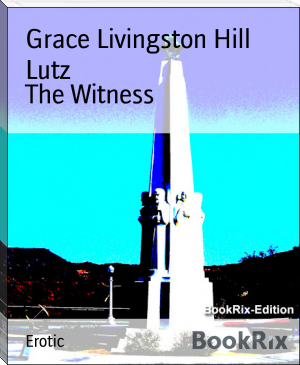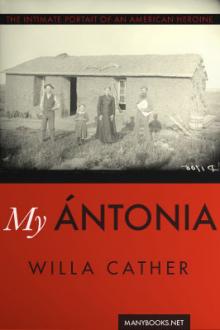The Witness by Grace Livingston Hill Lutz (mobi reader android TXT) 📕

- Author: Grace Livingston Hill Lutz
Book online «The Witness by Grace Livingston Hill Lutz (mobi reader android TXT) 📕». Author Grace Livingston Hill Lutz
Czar's Government Announced New Fundamental Laws Which Limited The Powers
Of The Duma And Practically Reduced It To A Farce. In The First Place, The
Imperial Council Was To Be Reconstituted And Set Over The Duma As An Upper
Chamber, Or Senate, Having Equal Rights With The Duma. Half Of The Members
Of The Imperial Council Were To Be Appointed By The Czar And The Other Half
Elected From Universities, Zemstvos, Bourses, And By The Clergy And The
Nobility. In Other Words, Over The Duma Was To Be Set A Body Which Could
Always Be So Manipulated As To Insure The Defeat Of Any Measure Displeasing
To The Old Régime. And The Czar Reserved To Himself The Power To Summon Or
Dissolve The Duma At Will, As Well As The Power To Declare War And To Make
Peace And To Enter Into Treaties With Other Nations. What A Farce Was This
Considered As A Fulfilment Of The Solemn Assurances Given In October, 1905!
But The Reactionary Madness Went Even Farther; Believing The Revolutionary
Movement To Have Been Crushed To Such A Degree That It Might Act With
Impunity, Autocracy Took Other Measures. Three Days Before The Assembling
Of The Duma The Czar Replaced His Old Ministry By One Still More
Reactionary. At The Head Of The Cabinet, As Prime Minister, He Appointed
The Notorious Reactionary Bureaucrat, Goremykin. With Full Regard For The
Bloody Traditions Of The Office, The Infamous Stolypin, Former Governor Of
Saratov, Was Made Minister Of The Interior. At The Head Of The Department
Of Agriculture, Which Was Charged With Responsibility For Dealing With
Agrarian Problems, Was Placed Stishinsky, A Large Landowner, Bitterly
Hostile To, And Hated By, The Peasants. The Composition Of The New Ministry
Chapter 1 Pg 9Was A Defiance Of The Popular Will And Sentiment, And Was So Interpreted.
The Duma Opened On April 27th, At The Taurida Palace. St. Petersburg Was A
Vast Armed Camp That Day. Tens Of Thousands Of Soldiers, Fully Armed, Were
Massed At Different Points In Readiness To Suppress Any Demonstrations By
The Populace. It Was Said That Provocateurs Moved Among The People, Trying
To Stir An Uprising Which Would Afford A Pretext For Action By The
Soldiers. The Members Of The Duma Were First Received By The Czar At The
Winter Palace And Addressed By Him In A Pompous Speech Which Carefully
Avoided All The Vital Questions In Which The Russian People Were So Keenly
Interested. It Was A Speech Which Might As Well Have Been Made By The First
Czar Nicholas. But There Was No Need Of Words To Tell What Was In The Mind
Of Nicholas Ii; That Had Been Made Quite Evident By The New Laws And The
New Ministry. Before The Duma Lay The Heavy Task Of Continuing The
Revolution, Despite The Fact That The Revolutionary Army Had Been Scattered
As Chaff Is Scattered Before The Winds.
The First Formal Act Of The Duma, After The Opening Ceremonies Were
Finished, Was To Demand Amnesty For All The Political Prisoners. The
Members Of The Duma Had Come To The Taurida Palace That Day Through Streets
Crowded With People Who Chanted In Monotonous Chorus The Word "Amnesty."
The Oldest Man In The Assembly, I.I. Petrunkevitch, Was Cheered Again And
Again As He Voiced The Popular Demand On Behalf Of "Those Who Have
Sacrificed Their Freedom To Free Our Dear Fatherland." There Were Some
Seventy-Five Thousand Political Prisoners In Russia At That Time, The
Flower Of Russian Manhood And Womanhood, Treated As Common Criminals And,
In Many Instances, Subject To Terrible Torture. Well Might Petrunkevitch
Proclaim: "All The Prisons Of Our Country Are Full. Thousands Of Hands Are
Being Stretched Out To Us In Hope And Supplication, And I Think That The
Duty Of Our Conscience Compels Us To Use All The Influence Our Position
Gives Us To See That The Freedom That Russia Has Won Costs No More
Sacrifices ... I Think, Gentlemen ... We Cannot Refrain Just Now From
Expressing Our Deepest Feelings, The Cry Of Our Heart--That Free Russia
Demands The Liberation Of All Prisoners." At The End Of The Eloquchrist. He Let Me Live In Him. I Am The
Christ You Sneered At And Disbelieved!"
He Looked And His Heart Was Stricken With Shame.
"I Did Not Understand. It Was Against Reason. But Had Not Seen You
Then."
"And Now?"
"Now? What Do You Want Of Me?"
"You Shall Be Shown."
Chapter 1 Pg 10
The Smoke Ebbed Low And Swung Away His Consciousness, And Even The Place
Grew Dim About Him, But The Presence Was There. Always Through Suspended
Space As He Was Borne Along, And After, When The Smoke Gave Way, And
Air, Blessed Air, Was Wafted In, There Was The Presence. If It Had Not
Been For That He Could Not Have Borne The Awfulness Of Nothing That
Surrounded Him. Always There Was The Presence!
There Was A Bandage Over His Eyes For Days; People Speaking In Whispers;
And When The Bandage Was Taken Away There Were The White Hospital Walls,
So Like The Walls Of Smoke At First In The Dim Light, High Above Him.
When He Had Grown To Understand It Was But Hospital Walls, He Looked
Around For The Presence In Alarm, Crying Out, "Where Is He?"
Bill Ward And Tennelly And Pat Were There, Huddled In A Group By The
Door, Hoping He Might Recognize Them.
"He's Calling For Steve!" Whispered Pat, And Turned With A Gulp While
The Tears Rolled Down His Cheeks. "He Must Have Seen Him Go!"
The Nurse Laid Him Down On The Pillow Again, Replacing The Bandage. When
He Closed His Eyes The Presence Came Back, Blessed, Sweet--And He Was At
Peace.
The Days Passed; Strength Crept Back Into His Body, Consciousness To His
Brain. The Bandage Was Taken Off Once More, And He Saw The Nurse And
Other Faces. He Did Not Look Again For The Presence. He Had Come To
Understand He Could Not See It With His Eyes; But Always It Was There,
Waiting, Something Sweet And Wonderful. Waiting To Show Him What To Do
When He Was Well.
The Memorial Services Had Been Held For Stephen Marshall Many Days, The
University Had Been Draped In Black, With Its Flag At Half-Mast, The
Proper Time, And Its Mourning Folded Away, Ere Paul Courtland Was Able
To Return To His Room And His Classes.
They Welcomed Him Back With Touching Eagerness. They Tried To Hush Their
Voices And Temper Their Noisiness To Suit An Invalid. They Told Him All
Their News, What Games Had Been Won, Who Had Made Phi Beta Kappa, And
What Had Happened At The Frat. Meetings. But They Spoke Not At All Of
Stephen!
Down The Hall Stephen's Door Stood Always Open, And Courtland, Walking
That Way One Day, Found Fresh Flowers Upon His Desk And Wreathed Around
His Mother's Picture. A Quaint Little Photograph Of Stephen Taken
Several Years Back Hung On One Wall. It Had Been Sent At The Class's
Request By Stephen's Mother To Honor Her Son's Chosen College.
The Room Was Set In Order, Stephen's Books Were On The Shelves, His Few
College Treasures Tacked Up About The Walls; And Conspicuous Between The
Windows Hung Framed The Resolutions Concerning Stephen The Hero-Martyr
Of The Class, Telling Briefly How He Had Died, And Giving Him This
Tribute, "He Was A Man!"
Chapter 1 Pg 11
Below The Resolutions, On The Little Table Covered With An Old-Fashioned
Crocheted Cotton Table-Cover, Lay Stephen's Bible, Worn, Marked, Soft
With Use. His Mother Had Wished It To Remain. Only His Clothes Had Been
Sent Back To Her Who Had Sent Him Forth To Prepare For His Life-Work,
And Received Word In Her Distant Home That His Life-Work Had Been
Already Swiftly Accomplished.
Courtland Entered The Room And Looked Around.
There Were No Traces Of The Fray That Had Marred The Place When Last He
Saw It. Everything Was Clean And Fine And Orderly. The Simple Saint-Like
Face Of The Plain Farmer's-Wife-Mother Looked Down Upon It All With
Peace And Resignation. This Life Was Not All. There Was Another. Her
Eyes Said That. Paul Courtland Stood A Long Time Gazing Into Them.
Then He Closed The Door And Knelt By The Little Table, Laying His
Forehead Reverently Upon The Bible.
Since He Had Returned To College And Things Of Life Had Become More
Real, Reason Had Returned To Her Throne And Was Crying Out Against His
"Fancies." What Was That Experience In The Hospital But The Phantasy Of
A Sick Brain? What Was The Presence But A Fevered Imagination? He Had
Been Growing Ashamed Of Dwelling Upon The Thought, Ashamed Of Liking To
Feel That The Presence Was Near When He Was Falling Asleep At Night.
Most Of All He Had Felt A Shame And A Land Of Perplexity In The
Biblical-Literature Class Where He Faced "Facts" As The Professor Called
Them, Spoken In Capitals. Science Was Another Force Which
Mocked His Fancies. Philosophy Cooled His Mind And Wakened Him
From His Dreams. In This Atmosphere He Was Beginning To Think That He
Had Been Delirious, And Was Gradually Returning To His Normal State,
Albeit With A Restless Dissatisfaction He Had Never Known Before.
But Now In This Calm, Rose-Decked Room, With The Quiet Eyes Of The
Simple Mother Looking Down Upon Him, The Resolutions In Their
Chaplet-Of-Palm Framing, The Age-Old Bible Thumbed And Beloved, He Knew
He Had Been Wrong. He Knew He Would Never Be The Same. That Presence,
Whoever, Whatever It Was, Had Entered Into His Life. He Could Never
Forget It; Never Be Convinced That It Was Not; Never Be Entirely
Satisfied Without It! He Believed It Was The Christ! Stephen Marshall's
Christ!
By And By He Lifted Up His Head And Opened The Little Worn Bible,
Reverently, Curiously, Just To Touch It And Think How The Other Boy Had
Done. The Soft, Much-Turned Leaves Fell Open Of Themselves To A Heavily
Marked Verse. There Were Many Marked Verses All Through The Book.
Courtland's Eyes Followed The Words:
He That Believeth On The Son Of God Hath The Witness In
Himself.
Could It Be That This Strange New Sense Of The Presence Was "The
Witness" Here Mentioned? He Knew It Like His Sense Of Rhythm, Or The
Look Of His Mother's Face, Or The Joy Of A Summer Morning. It Was Not





Comments (0)